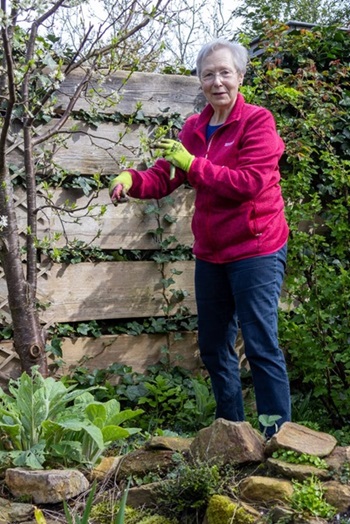
Wikipedia defines a special interest group (SIG) as ‘a community within a larger organization with a shared interest in advancing a specific area of knowledge, learning or technology where members cooperate to effect or to produce solutions within their particular field, and may communicate, meet, and organize conferences’.
SENSE has nine SIGs that organize talks a few times a year in person or online, and whose meetings are open to Society members and non-members (guests) alike. All SIG meetings are announced well in advance on our SENSE calendar. This week, I invite you to meet UniSIG and its convener, Joy Burrough-Boenisch (on the right, inspecting her damson tree), a SENSE founding member and an honorary member of our Society.
Your encounter with Jackie Senior in the Netherlands in 1989 prompted the creation of SENSE. Can you tell us about your background and a bit about that fortunate encounter?
I arrived in the Netherlands in 1976, as ‘wife of’ a scientist. I had met him in Oxford, and we continued to exchange letters after he went to Sabah (Malaysian Borneo) to map soil and I went to Canada to do an MA in Tropical Geography. During the UK postal strike from January to March 1971, when I was writing up my thesis on Guyanese peasant agriculture in the bitterly cold Montreal winter, our correspondence thrived. In spring he wrote, asking me to marry him. He was even prepared to pay my air fare! So I flew to meet him in Kuala Lumpur, we went on to Sabah and were married there in June. While living in Sabah, I did some research, published articles on ethnography and on periodic markets (a booklet), co-edited The Sabah Society Journal and edited reports written by Malaysian agricultural scientists. After we moved on to Sydney, this experience helped me get a job as an Editorial Officer at the New South Wales Department of Agriculture, where I learnt to compile and copy-edit informational leaflets for farmers. After our first son was born, I took on freelance editing work for several academic publishers in Sydney. But we decided to move back to Europe, to a more fulfilling academic environment and to be nearer to our parents. The Netherlands was intended to be a stepping stone to Britain: my husband initially landed a one-year visiting-scientist post, then became a lecturer in Wageningen, and soon after a professor at Utrecht University. With very little childcare available and my second son on the way, I continued as a freelance editor and found it easy to get work editing papers by scientists from Wageningen’s research institutes and Landbouwhogeschool. I joined the European Association of Science Editors (EASE), and it was my 1989 letter about Dunglish published in the EASE journal that prompted Jackie Senior to write to me, as she’s explained elsewhere on the SENSE Blog.
Do you recall being part of SENSE SIGs back then?
When SENSE was launched in 1990 our options for contacting colleagues were to use a phone tethered to the wall to call a similar device in a building elsewhere, to transmit a written document via a facsimile machine (‘fax’) or to post a letter. So, to answer your question about SIGs, I turned to the early SENSE paper newsletters in which meetings were announced. The first SIG mentioned was the Writing Teachers’ Support Group, later the Writing Teachers’ Group (WTG). Initiated by Ruth de Wijs and the Newsletter editor Victoria Thatcher, it first met in November 1991. The following year, a training group committee was created to organize workshops and speaker-based meetings in hired venues. The groups and the various ‘regional informal gatherings’ organized in the 1990s to discuss work-related issues were generally held in members’ homes, as were the ‘translation special interest groups’ (among them the Utrecht SIG) formed in 2000.
Round about 1996, SENSE members began emailing each other, and the email forum was set up. From then on, meetings could be announced quickly and easily, and by the turn of the century various SIGs had crystallized out – and WTG had become SenseEd.
When did you start serving as UniSIG convener?
UniSIG is a spinoff of an initiative by Camilla Brokking-Maltas, an Australian who continued to accept assignments to edit student dissertations from ‘down under’ when she moved here and was amazed to find that the ethical implications of such work were a non-issue in the Netherlands, whereas in Australia the Institute of Professional Editors guidelines on editing dissertations and theses had been adopted by Australian universities. It was the SENSE working group Camilla initiated in 2014 that drew up the SENSE Guidelines for Proofreading Student Texts, published in 2016.
The first UniSIG meeting was on 17 June 2015. Co-convened by Camilla and me, it featured a talk by Alison Edwards on the rise of English in Dutch universities. Thereafter, several in-person UniSIG meetings were held every year. In 2017, Camilla left SENSE to take up employment in a different sector, and I continued as convener. By then, UniSIG had 42 members on its mailing list.
Can you walk us through the latest UniSIG meetings?
During the Covid pandemic I organized online meetings via Zoom, drawing speakers (and guest attendees) not only from SENSE and the Netherlands but also from abroad. 2021 was our peak year, with nine meetings. Since then, we’ve returned to a more relaxed schedule. In February this year our speaker was Barcelona-based Mary Ellen Kerans, a founder member of our sister organization Mediterranean Editors and Translators. She discussed the plagiarism allegations made against Harvard University’s president – see the excellent blog by Nancy du Plessis. For our most recent meeting we linked up with Dr Vasiliki (Vicky) Mollaki, Scientific Officer at the Hellenic Commission for Bioethics and Technoethics in Athens, who discussed how generative AI is affecting the peer review process.
|
Blog post by: Paula Arellano Geoffroy Website: paulaarellanogeoffroy.com LinkedIn: paula-arellano-geoffroy |
